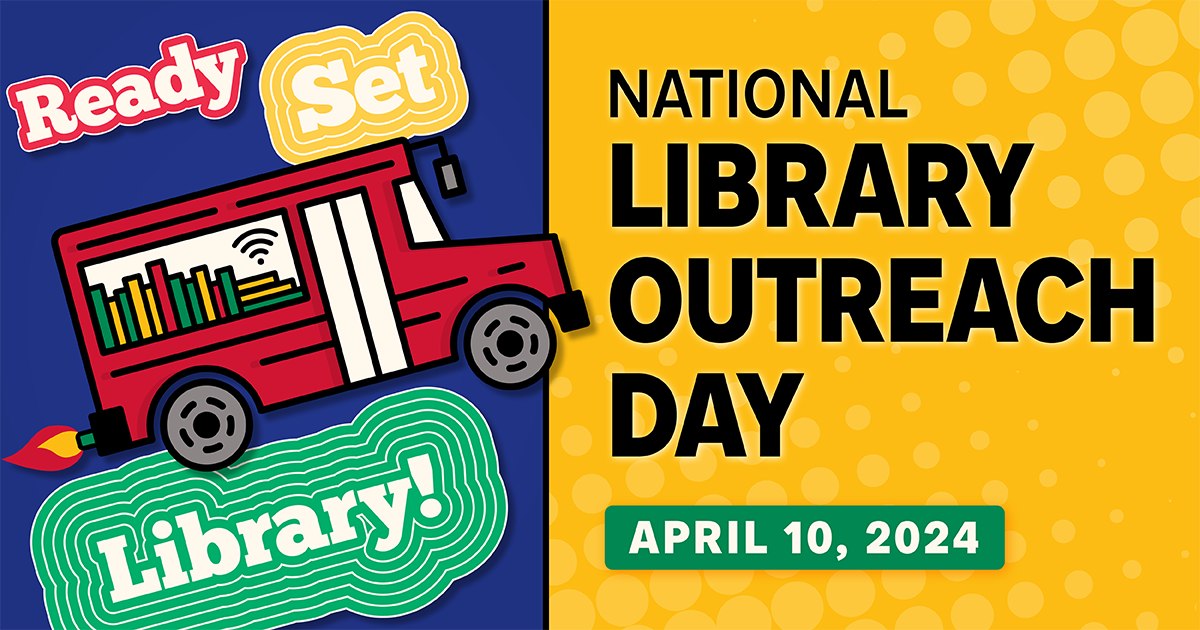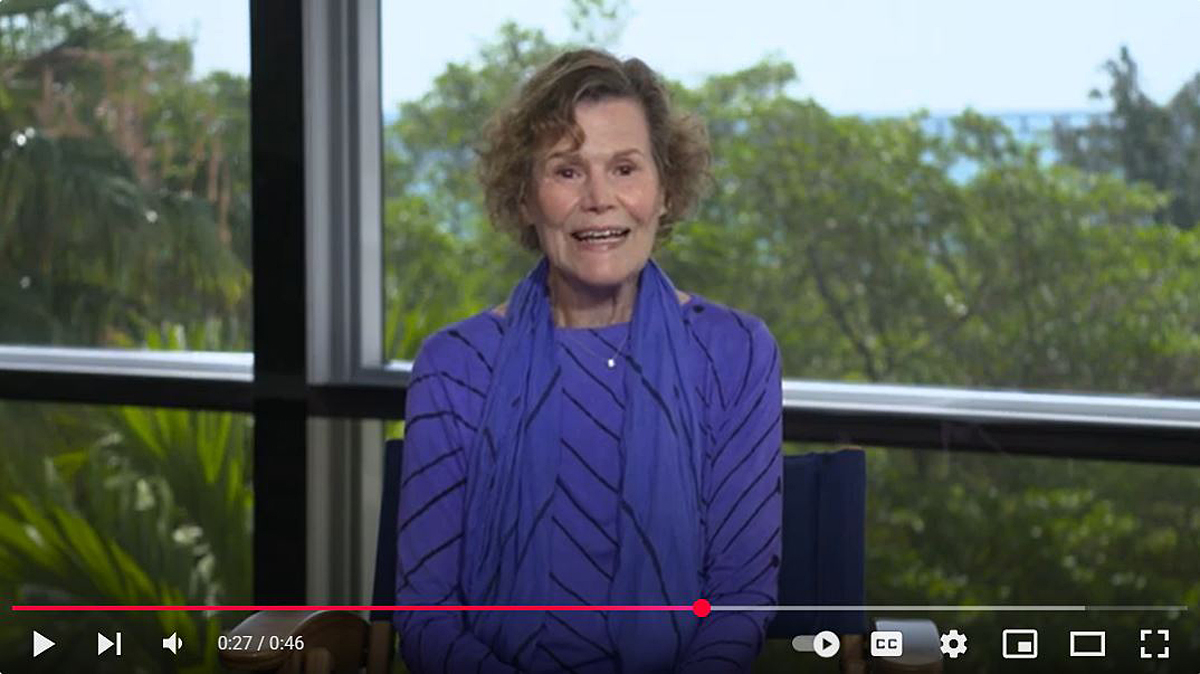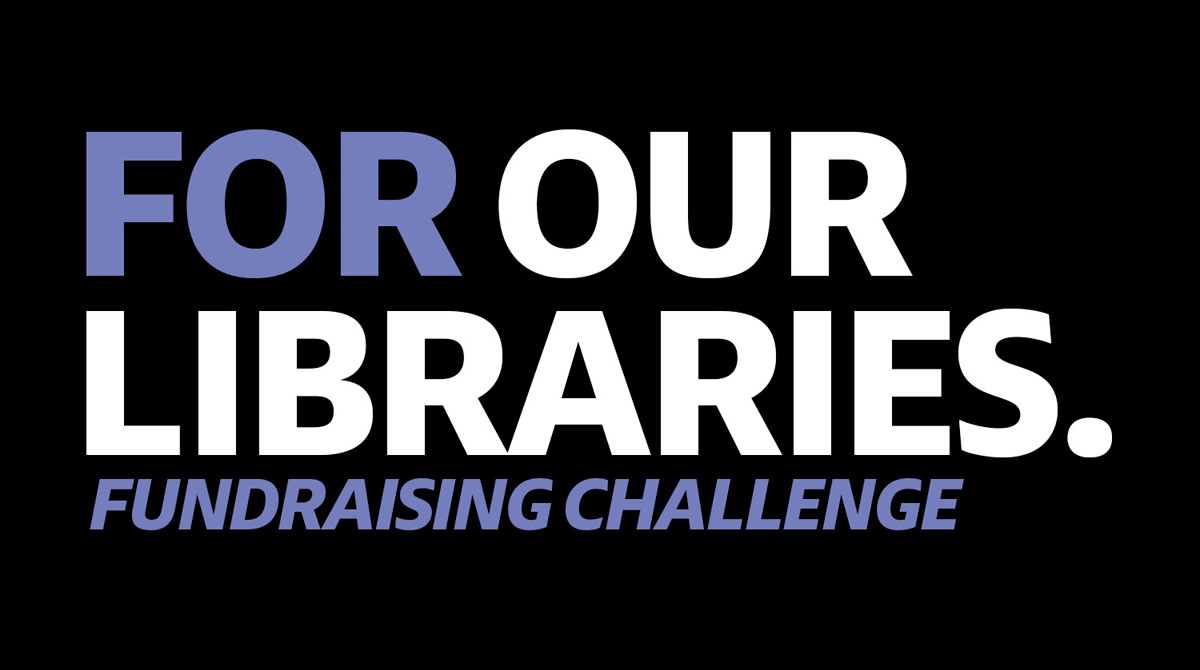2023 was a tumultuous year for libraries. Book bans dominated headlines as well as city council and school board meetings, threatening the access of information to readers of all ages and the livelihoods and safety of library workers across the country. Despite these upheavals, libraries soldiered on to provide critical services to their communities-and developed truly innovative programs along the way. This National Library Outreach Day, we survey some standouts.
Building bridges to social and health services
The economic impact of the past few years has disproportionately affected renters across the country. Rents rose at an unprecedented pace in the second half of 2021 (when the Centers for Disease Control and Prevention lifted its pandemic-era eviction moratorium) with typical asking rents rising 11% year over year nationwide that September, according to the Joint Center for Housing Studies at Harvard University.
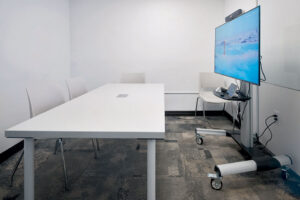
A kiosk at Cleveland Public Library’s (CPL) South branch. CPL has four Neighborhood Housing Court kiosks throughout the city to assist residents who need to attend hearings.
Since May 2020, when Cleveland Housing Court’s pandemic-related pause on the processing of non-emergency evictions ended, more than 18,200 evictions were filed in the city. As of November 2023, the city’s eviction filing rate was 6%, or nearly 6,600 filings over the past 12 months. To help address this urgent community issue, Cleveland Public Library (CPL) opened four Neighborhood Housing Court kiosks at branches across the city, in partnership with Cleveland Housing Court. The videoconferencing kiosks are available by registration or on a walk-in basis for individuals who need to appear before the court and need a more convenient hearing location.
Kiosk locations were selected based on eviction rate data. Their availability at CPL branches has removed barriers for residents, many of whom are unable to travel to the courthouse downtown for various reasons to meet their court date. Since the launch of the first kiosk, bailiffs’ sign-in sheets have registered dozens of users.
“CPL can be a bridge between justice and accessibility, providing vital resources to our neighborhoods,” wrote Felton Thomas, Jr., CPL executive director and CEO, and Tana Peckham, CPL chief strategy officer, in “American Libraries.” “By working with partners, we can make a brighter and more just future for all.”
Bridging the digital divide is one of the Network of the National Library of Medicine’s (NNLM) national initiatives, and it partnered with public libraries to enact a new initiative to help bring online medical services to the community.
The NNLM created its Telehealth Interest Group in 2021 in response to the accelerated use of telehealth services during the COVID-19 pandemic, and public library workers were active participants. The interest group saw an opportunity to support library and other health information workers in understanding their potential roles in the broader digital health landscape.
In June 2023, the interest group launched “Telehealth 101: What Libraries Need to Know,” a free, national online course that amplifies different approaches and models libraries may use to provide telehealth services; identifies infrastructure-related resources available to libraries interested in providing such services; explores privacy and policy considerations for offering telehealth services within libraries; and more.
“We’ve all benefited from the generous knowledge of library telehealth pioneers like the Pottsboro Area Library in Texas, to Delaware Libraries #GetConnectedDE initiative, and Hawai’i State Public Library’s strategic telehealth collaboration,” said Liz Morris, outreach and access coordinator, NNLM Region 5, University of Washington Health Sciences Library.
“We’ve highlighted emerging research about the telehealth infrastructure capabilities of libraries in Virginia. We’ve learned about programs like Libraries Health Connect supported by the Maine State Library, and Telehealth in Libraries led by the Idaho Commission for Libraries. We know that there are many other library telehealth programs already operating or preparing to operate and are eager to share learning as it emerges.”
To date, 88 information professionals from public libraries, academic libraries, health science libraries, hospital libraries, and other stakeholder organizations have participated in the course. The interest group has also started a webinar series to continue sharing emerging research and best practices for library workers interested in telehealth.
Creating accessible spaces
Penn State University Libraries launched three sensory rooms at its Berks, Brandywine, and University Park campuses to support student wellness and belonging through the libraries’ LibWell initiative.
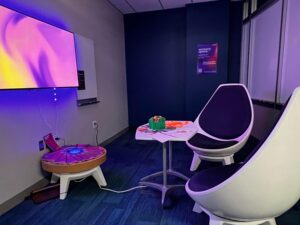
The Sensory Room in Pattee Library’s Collaboration Commons, on the University Park campus. Penn State University Libraries is piloting two such rooms that offer dedicated space to help meet the varied sensory needs of neurodiverse students. Photo: Jennifer Cifelli / Penn State. Creative Commons
The rooms are designed to provide a safe, inviting space for neurodivergent students who may struggle in traditional study spaces. They are equipped with noise-reducing chairs, specialized lighting, yoga mats, weighted lap blankets, and other features to help reduce stress and anxiety. These sensory-sensitive elements are particularly helpful for students with autism, attention-deficit/hyperactivity disorder, dyslexia, and post-traumatic stress disorder.
“There is a strong need for therapeutic spaces at colleges that can help students block out harmful sensory distractions and relieve the huge burden of anxiety many students bear,” said Brett Spencer, reference and instruction librarian at Penn State Berks’ Thun Library. “We want to make sensory-safe places that can help students maximize their wellness and learning.”
To advance its ongoing mission to provide resources and “an environment that encourages scholarship, creativity and intellectual freedom, while supporting the diverse needs of all users,” the University of Colorado Colorado Springs (UCCS) Kraemer Family Library created an endowed Storytelling Professor position.
Currently held by assistant professor of Native American and Indigenous studies, ‘Ilaheva Tua’one, PhD, the position, which rotates every three years, provides an interdisciplinary opportunity for community engagement and celebration of a diverse range of storytelling histories and experiences.
The position, as well as other initiatives, earned the library an Insight Into Diversity Library Excellence in Access and Diversity (LEAD) Award by “Insight Into Diversity” magazine, the largest and oldest diversity and inclusion publication in higher education.
“The program not only enriches the academic environment but also serves as a beacon for inclusivity and cultural richness, reflecting a deep commitment to celebrating a wide array of perspectives and narratives,” wrote Communique, the official publication of UCCS.
Medina County (Ohio) District Library (MCDL) used its $20,000 Libraries Transforming Communities (LTC): Accessible Small and Rural Communities grant from the American Library Association (ALA) to install hearing loop technology at its location in Medina, Ohio.
Hearing loops serve as wireless loudspeakers for people who use hearing aids. An induction loop system delivers clear, customized sound by transmitting magnetic energy through a wire that surrounds an area. The system can link to most hearing assistive devices via Bluetooth, allowing individuals with hearing devices connected to the loop to hear the transmitted sound while within the area.
“[The hearing loop] will be installed in our community rooms and at the customer service and adult reference desks to help those with hearing loss benefit from library events and services at a higher level,” Sue Schuld, MCDL technology manager, told Cleveland.com.
MDCL’s project is one of 240 LTC-funded proposals, representing 43 US states and the Northern Mariana Islands. To be eligible for the grant, a library must have a legal service area population of 25,000 or less and be located at least five miles from an urbanized area, in keeping with the Institute of Museum and Library Services definitions of small and rural libraries. Of the selected libraries, 65% serve communities of fewer than 5,000 people.
When Indianapolis’ newest library opened in August 2023, it was the first in the state to be a Certified Autism Center.
Indianapolis Public Library’s Fort Ben branch was designed with the needs of neurodivergent visitors in mind. It offers a comfort room, sensory kits, and other resources to enhance accessibility. Library staffers also completed an autism-specific training program to receive the certification.
Fort Ben branch manager Shelby Peak told Axios that the training helped her staff understand how to create a more welcoming experience for neurodivergent individuals and their families, from regular interactions to specific programming, like sensory-friendly storytime.
“Having that label on there makes it a judgment-free zone,” Peak said. “Families know that if they come to this, they’re going to be accepted no matter what happens.”
Food and housing help
Spartanburg County is the fifth most populated county in South Carolina, and it is growing. In 2022, it had close to 346,000 residents, but nearly 14% of them were living at or below the federal poverty line, with an estimated 11% of children experiencing food insecurity. To help address these issues of affordability and access, Spartanburg County Public Libraries (SCPL) started its Bags of Hope initiative in 2021, connecting food and other essential items to those in need.
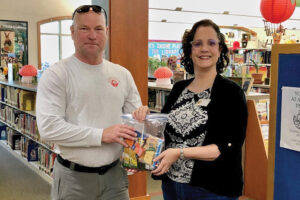
Anna Pilston (right), branch librarian at Spartanburg County (S.C.) Public Libraries’ Landrum Library, holds a Bag of Hope alongside a member of Operation Hope, a local nonprofit. Photo: Spartanburg County (S.C.) Public Libraries
SCPL’s Bags of Hope program requires little or no library funding and is similar to other efforts that have been implemented by nonlibrary community organizations across the country to provide bags of food and other necessities to individuals who may be facing poverty. Library patrons, staffers, and other donors drop off individually packaged food and hygiene products-including granola bars, cups of soup, crackers, mini-toiletries, and utensils-at their local library branch. The goods are then packed up and delivered to 11 designated partner organizations across the county- food pantries, soup kitchens, community centers, and other nonprofits-to be distributed to those in need.
In 2023, SCPL donated more than 740 gallon-sized zipper storage bags’ worth of items, 47 large sacks and 16 boxes of food and supplies that were too big to fit into the bags.
“The program is more than worthwhile, both for its service for our patrons in need and for the opportunity it creates to enhance community connections,” wrote Todd Stephens, SCPL county librarian, in “American Libraries.”
Many libraries across the country are helping to address food insecurity by installing community fridges stocked with fresh foods and perishables with the goal of nourishing their neighborhoods and reducing the stigma around food assistance.
Charleston County (S.C.) Public Library (CCPL) installed its Free and Fresh Fridges inside three of its 18 branches to strategically reach the highest level of need. At any given time, an assortment of potatoes, tomatoes, cucumbers, and other fresh produce is available free of charge.
Des Moines (Iowa) Public Library (DMPL) has installed fridges at two branches. Nikki Hayter, supervising librarian at DMPL’s Franklin Avenue branch, was inspired to act after local data indicated that her library’s zip code had one of the highest concentrations of food pantry use in Des Moines from July 2021 to June 2022.
“Our mission is to strengthen our community by connecting people with the ideas and tools they need to enrich their lives,” says Hayter. “I don’t know what could be much more enriching than food.”
Teaching social justice
Prospect Sierra School (PSS) in El Cerrito, California, developed a program to engage students in social justice issues and increase collaboration between librarians and teachers- and it is winning awards for its success.
PSS’s “Global Human Rights Research Project” was the recipient of the 2023 American Association of School Librarians’ Roald Dahl’s Miss Honey Social Justice Award for its “Global Human Rights Research Project.” The award recognizes collaboration between school librarians and teachers in the instruction of social justice using school library resources.
In a six-week collaboration between PSS middle school librarians Julia Bourland and Mia Gittlin, and seventh-grade humanities teachers Lauren Konopka and Matthew Williams, students became experts and advocates for change on at least one human rights violation central to the theme of a historical novel of their choosing. At the end, the librarians attended the students’ multifaceted presentations, which included a book review, an infographic explaining the historical incident they studied, and a call to action on how others can speak out about similar human rights violations happening today.
“The works of Roald Dahl offer students inspiration for becoming the heroes of their own stories who fight for justice and work together to create a better world for themselves and for others,” Bourland said. “The primary objectives in this collaboration were for students to make connections between human rights violations that occurred in the past and current ones, to increase student agency in understanding global injustice, and to help them find their voice inspiring others to learn about the issue and take action.”
Revving an economic engine
Small business is big business in America, and libraries are making an investment in their future.
According to the U.S. Small Business Administration, there are 33.3 million small businesses in the United States, accounting for 99.9% of all U.S. businesses and nearly half of the country’s workforce. Libraries are supporting small businesses and budding entrepreneurs with everything from pop-up marketplaces to intellectual property and patent guidance.
Baltimore County (Md.) Public Library’s (BCPL) Pop-Up Shops program invites local vendors-from jewelry and candle makers to photographers to tutors-to participate in a pop-up marketplace at several of the library’s branches. Along with providing free space to participate, the library also conducts vendor preparation classes with tips on organizing a vendor table, developing a sales story, and more.
BCPL’s Pop-Up Shops attract many vendors who participated in the library’s Entrepreneur Academy, a collaboration between BCPL and the Enoch Pratt Free Library that teaches many of the fundamentals of starting a small business, including market research, business structure, insurance and legal issues, and more. The program began in 2019 and was one of 13 projects to receive a Libraries Build Business grant from ALA.
While some libraries are supporting existing small businesses, others are helping potential ideas get off the ground.
Last year, the University of Iowa’s Lichtenberger Engineering Library became a designated Patent and Trademark Resource Center (PTRC) by the U.S. Patent and Trademark Office. The library now offers myriad ways for students and faculty to learn more about intellectual property and how to access patent records, including one-on-one assistance, trainings and workshops, and courses covering intellectual property topics as part of its information literacy program.
At the University of Puerto Rico in Mayagüez, Puerto Rico, librarian Gladys López-Soto has been supporting the entrepreneurial aspirations of the university community and Puerto Rican citizens for decades in the library’s PTRC. To date, she has helped thousands of people navigate the patent and trademark application process to protect their ideas while also providing resources in Spanish that reach communities across the U.S. López-Soto was awarded a 2024 I Love My Librarian Award from ALA for her impactful work in intellectual property.
Read more stories about library services in the U.S. in ALA’s 2024 State of America’s Libraries report.
